#theodosius i
Explore tagged Tumblr posts
Text
Coin of the Day #49 (6/22/2024)
A nice LRB with a large die break on the reverse…
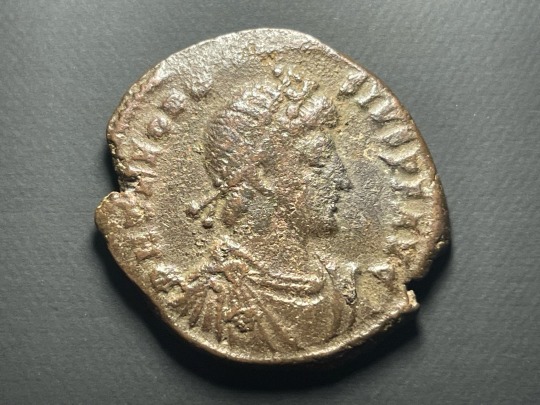
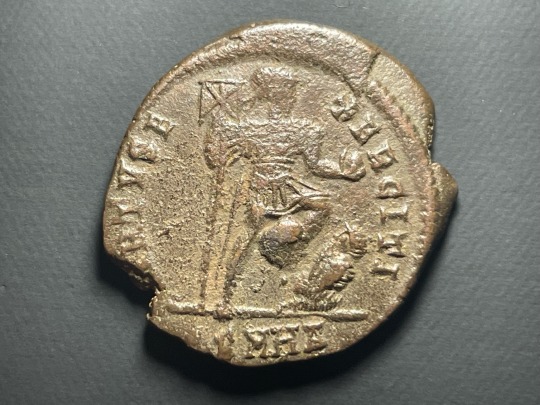
Roman Empire
AE24 - 5.67g
Theodosius I 383-388 AD
Heraclea Mint
Obverse D N THEODOSIVS P F AVG
Bust of Theodosius I right, pearl-diademed, draped, cuirassed
Reverse VIRTVS EXERCITI
Emperor standing right, holding labarum and globe, left foot on captive, •SMHA mint
RIC IX 24b
#coin of the day#roman empire#Theodosius I#heraclea#roman coins#ancient rome#coin#coins#numismatics#ancient coins
3 notes
·
View notes
Text
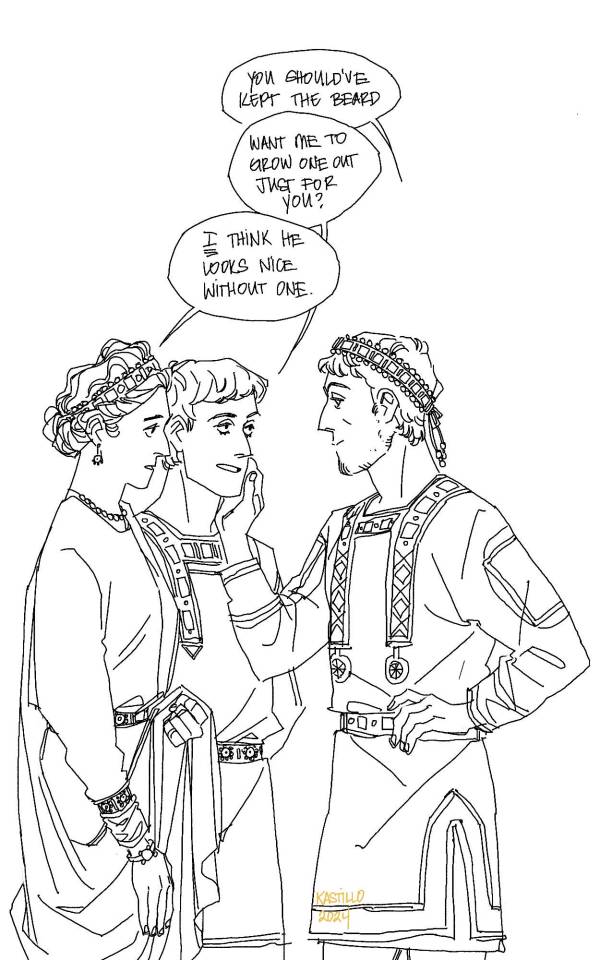
the way the valentinian and theodosian dynasties intermarried gives me a headache, so we'll just (hand waving) the marriage of licinia eudoxia and valentinian iii, also some normal ribbing between theodosius ii and valentinian iii
can you believe that we got another set of co-emperors with the theodosius-valentinian name set after the absolute disaster of the first pair? incredible!
#so. licinia and valentinian iii were bethrothed to each other when they were respectively two and four yrs old#valentinian iii and theodosius ii are half cousins#the way that the family branches intermarried gives me a headache but ESPECIALLY when i see the valentinian name#show up on the theodosian half of the tree. like what are you DOING there.#later roman empire tag#drawing tag
229 notes
·
View notes
Text
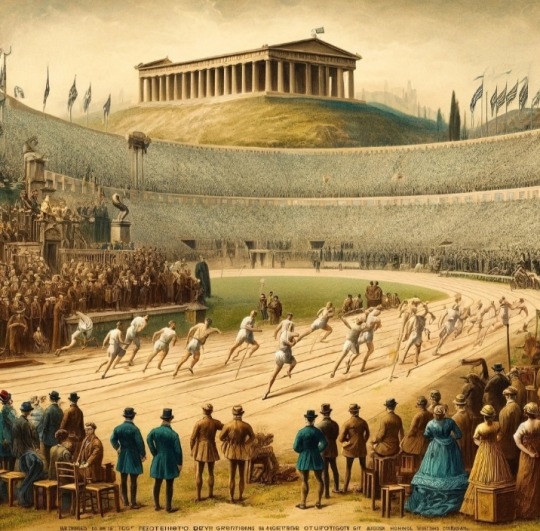
FUN FACT:
In 393 CE, Emperor Theodosius I (347–395) banned the Greek Olympics due to the religious element of the celebration.
He considered the Olympics to be a pagan festival, which had no place in his Christian empire.
As a consequence, the games were cancelled and didn’t start up again for over 1,400 years — until 1896.
#Greek Olympics#Olympics#Olympic Games#Emperor Theodosius I#Ancient Rome#roman empire#Paris 2024#2024 Paris Olympics#2024 Summer Games
23 notes
·
View notes
Text
ngl for all the 'people are obsessed with the roman empire' jokes, I keep running into roman emperors who don't have dedicated biographies
#smh. you all want to swap spit with augustus. where's the love for the later roman empire huh. you mean i have to do my own research#on valentinian 3. i was so spoiled with valens and theodosius. im suffering now#i dont WANT to do this. aughghhhhh. free me. FREE ME#(<< someone who spent the last two hours playing p5 and not doing any of this research at all)
4 notes
·
View notes
Text

(he's 27)
2 notes
·
View notes
Text
[Image description: White text on a red background edited to say "i don't think people understand that it actually physically fucking pains me that he's a dead historical figure and I can never actually beat his ass or know what it's like to kill him." End description.]

via this
#Emperor Theodosius I of Rome#several others can catch these hands too but if I had to choose one it'd be him
818 notes
·
View notes
Text
My feet are as fat as Eugenius, I hope this 10 year old can rule.
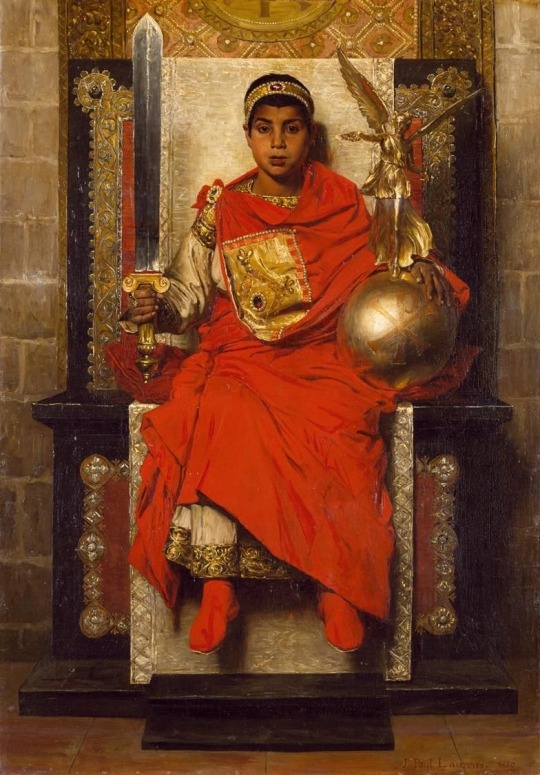
#honorius#arcadius#best dad of the century#I think I’m dying#screw you knock off second rate unholy heretic Eugenius#what does big swelling mean#godsplan#theodosius the great
1 note
·
View note
Text
Let's Talk About Drolta's Historical Context

Okay, anyone who has been around like fifteen Months ago, when the first season of Castlevania Nocturne released knows the drill. Let's do some history.
I will talk a bit about some historical context of the new season and I am going to start with Drolta, because oh boy, she definitely is an interesting character in this context. After all we learn her backstory this season - and it is actually really interesting.
I am super sorry, right now I cannot do proper screenshots from the flashbacks. So bear with me.
Spoilers for season 2, obviously!
The first scene we see with Drolta is her at a temple of Sekhmet in Southern Egypt in what we get told is 1199 CE. Now, this is interesting. Because this is far, far after the end of anything recognizable as "Ancient Egypt". In 1199 CE what we now know as Egypt was under the control of the Ayyubid dynasty. A Muslim government.
Now, Egypt in terms of religion was a bit of a battleground in the early middle ages.
There is one thing y'all need to understand about the Ancient Egyptian religion. It has a lot of staying power. I have heard so many Egyptologists joke about this. Egypt was colonized so often - and while most other countries got then forced into another religion under the Romans and Greeks, somehow everyone in Egypt during Ancient Times went just and adopted the Egyptian religion. Something that is quite interesting, because Egyptian religion - in terms of anthropology - is an older religion that bears a lot of hallmarks of old religions. I talked about this before: From what we can say, first human religions worshipped animal gods, that then became some sort of chimera, that took up more and more human attributes, before the gods became humanoid in their appearance. And if you know anything about Egyptian religion, than it will be probably that the gods have all their animal aspects, dating it as a bit earlier than the Greek and Roman religion - even though some of the oldest Greek gods also have still their animal aspects (like Pan).
Now, due to the later Roman/Byzantine Empire Christianizing - and Egypt being part of it - Egypt was Christianized as well. And this is where we talk about this one historical figure that somehow haunts me in all my creative persuits: Emperor Theodosius I. He was a hardliner for Christianity. Until he came into power, Christianity was not exactly chill with the pagan religions, but accepted them somewhat. And then Theodosius enacted a decree that set fire to all the pagan temples in the Empire. And they burned down a lot of temples to the old gods. That was the Roman gods, the Greek gods, the Egyptian gods, and some pagan gods of a variety of smaller religions, like the Canaanites and such.
However, again: The Egyptian religion had a hell lot of staying power. So yes, people would often "convert" to Christianity at the point of a sword but secretly still pray to the old gods still.
Between the 7th and the 8th century, Egypt was taken over by the Muslims, and a lot of people converted to Islam. However, as I spoke about before: Muslims were always a lot more chill about other religions. So while people praying to other gods were higher taxed, it was generally just allowed.
In 1199 - as I said - Egypt was under the control of the Ayyubid Dynasty, with the majority of people living there being Muslim.
Realistically speaking, we do not have any historical evidence for any acitve temples to any of the Egyptian deities for after the 9th century, from all I know. While some aspects of the Ancient Egyptian religion were generally were incorporated into Muslim tradition - and still are to this day (like some Ancient holidays are still celebrated in Egypt to this day!) - but from all we know there was no active temple worship.
However, realistically speaking, obviously none of the temples held the actual mummy of an actual god. lol By the time Egypt Islamized, most of the actual mummies of even kings were long forgotten and burried under the sands of the deserts and people practices burial of the dead.
If there had actually been an active temple, yes. It is absolutely possible that this temple would have been attacked and plundered multiple times. And of course anyone still worshipping the old gods would absolutely know that their religion was kinda doomed to disappear. They would be a small holdout. And in this case there is of course the additional aspect of knowing that the goddess one prays to is already physically dead. (Fuck, I need to talk about the worldbuilding in this. I hope I will around it - because I am out of town over the weekend. Argh.)
The attackers we mainly see in the temple are just random bandits. However, the vampire who comes later, definitely wears a specific armor - though this is where I still need to do some research. While I recognize some aspects of the armor, I could not properly place it - because it is definitely a bit too early for Ottomans. (My first thought was Ottoman because of the helmet, but yeah, the Ottoman empire is 250 years out at this point.) The slightly pointed helmet was also used in some part of the Byzantine army, but again, this definitely is something I will look more into.
From there on, of course, her story gets more dominated not by the historical context, but by the fictional worldbuilding.
Something that is however interesting is, that she is of course a member of a cult - and that is by the historical definition of the word, not the modern one.
See, historically speaking cult members where people who among a religion praying to a pantheon served just one deity. In Drolta's case of course this deity is Sekhmet, whom she revears above all the other gods. So much so, that she completely goes against the central cour of the religion at large - which was a religion in which the highest god was a sun god! Ra!
I think in general Drolta goes very strongly back there to something that very much is at the heart of Castlevania's vampire mythology: The way how vampires remain in that world that is changing around them, because the humans in this world are dying, and new humans have new ideas. The world changes - but the vampires are frozen in time.
She holds onto her old religion, that was technically already "dead" when she was born for the first time, and that just dies out further as she cannot die, because she is now a vampire.
In her pursuit of the will of a deity, whose will she thinks she knows, she is ironically very close to Isaac - though other than him, she canot find it in herself to turn it around. Especially after going down that wrong path for hundreds of years.
The interesting part of this though is, that it very much reframes Erszebeth from someone who came in as a colonizer to take the blood - in comparison to someone upon whom it was trust.
#castlevania#castlevania netflix#castlevania nocturne#ancient egypt#egyptian history#history#medieval history#medieval islam#history of islam#anthropology#castlevania drolta#drolta tzuentes
274 notes
·
View notes
Text
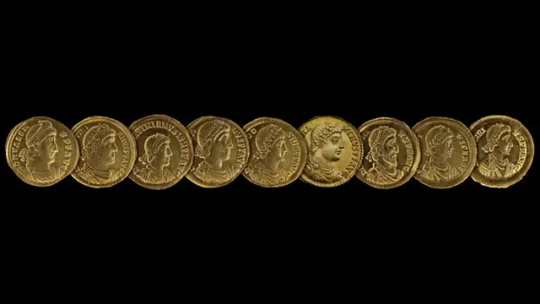
1,700-Year-Old Roman Gold Coin Hoard Found in Luxembourg
"Secret" excavations in Luxembourg reveal 141 Roman gold coins from eight Roman emperors and one usurper.
Archaeologists in Luxembourg have discovered a lavish 1,700-year-old hoard of Roman gold coins that had been placed near the foundations of a small, tower-like Roman fort.
The team unearthed 141 gold coins, which were minted between A.D. 364 and 408, in Holzthum, a village in northern Luxembourg. The coins feature portraits of eight emperors, but three coins portrayed an unexpected ruler: Eugenius, an illegitimate emperor of the Western Roman Empire who reigned for only two years (392 to 394).
This usurper, Eugenius, a rhetoric teacher and court official, was proclaimed emperor of the West by a powerful military officer, months after the western emperor Valentinian II was found hanged under mysterious circumstances. However, Theodosius I, the Christian emperor in the East, refused to recognize Eugenius and disapproved of his supposed policy of religious tolerance. This led to armed conflict and culminated in Eugenius' bloody defeat and death at the Battle of Frigidus in September 394. His coins are especially rare because his time in power was so short.
"This is a major archaeological discovery, as it is extremely rare to be able to study an entire ancient monetary deposit in its archaeological context," researchers wrote in a translated statement from the National Institute for Archaeological Research (INRA) in Luxembourg.
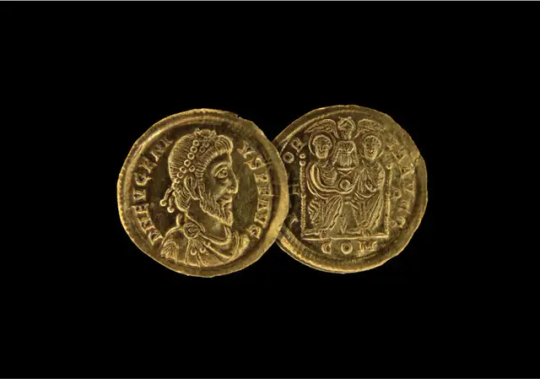
Because of its historical significance, the find was kept secret for almost four years, with excavations under the direction of INRA taking place from 2020 to 2024. The team also faced hazardous conditions, as there were multiple World War II munitions and explosives buried in the area, prompting the Luxembourg Army Mine Action Service (SEDAL) to help with the dig.
The gold coins are solidi, a term that comes from the Latin "solidus," meaning "solid" — a reference to their consistently reliable gold content. The coins, each of which weighs approximately 0.16 ounce (4.5 grams), were introduced at the beginning of the fourth century during the era of the "Later Roman Empire." The solidus remained relatively stable for centuries and spread throughout the entire Mediterranean region.
Following an independent analysis, which considered the "excellent condition" of the coins and "the presence of some rare specimens," the coins were valued at 308,600 euros, or nearly $322,000. In accordance with the legal provisions on cultural heritage, this sum is reserved for those who have legal rights, such as property holders, over the find.
"It will still take some time to process the excavations and finds," Luxembourg Culture Minister Eric Thill said in a translated parliamentary statement, "but it will undoubtedly increase our knowledge and understanding of the last century of the Roman Empire in the West."
The researchers plan to analyze the hoard further and eventually publish the results in a research journal.
By Marjanko Pilekić.
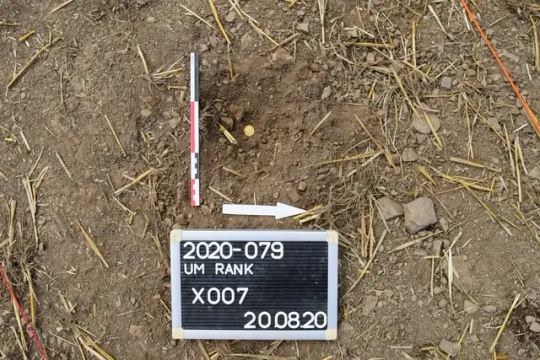
#1700-Year-Old Roman Gold Coin Hoard Found in Luxembourg#Holzthum#gold#gold coins#roman gold coins#collectable coins#ancient coins#ancient artifacts#archeology#archeolgst#history#history news#ancient history#ancient culture#ancient civilizations#roman history#roman empire#roman emperor
141 notes
·
View notes
Text
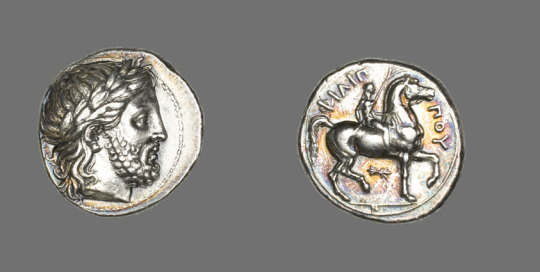
Tetradrachm (Coin) Depicting the God Zeus
Greek, Reign of Phillip II (359–336 BCE)
The official record of quadrennial games honoring the supreme Greek god Zeus at a sanctuary dedicated to him at Olympia began in 776 BCE. With few interruptions, they took place every four years for about 1,100 years. In 394, CE the Christian emperor Theodosius I (reigned 379–95) abolished them as pagan rites. The most prestigious competition remained the footrace, but eventually it was supplanted in popularity by the horse races. Horses were symbols of socioeconomic status, since only the privileged could afford to buy, feed, and train them and transport their teams and trainers to Olympia every four years. In time, many of the victors in the horse races included kings and tyrants. Philip II, king of Macedon, who minted this coin, owned the horse that won the race in Olympia in 356 BCE. The same year his son was born; he would grow up to become Alexander the Great (356–332 BCE). The head of Zeus on the front referred to Philip’s claim that his family descended from the god. On the back Philip commemorated his victory in the horse races of the Olympic Games with an image of a jockey astride his mount.
164 notes
·
View notes
Photo
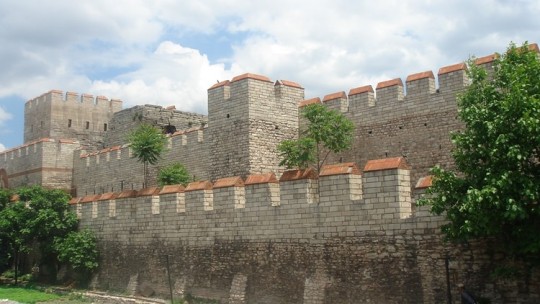
Theodosian Walls
The Theodosian Walls are the fortifications of Constantinople, capital of the Byzantine Empire, which were first built during the reign of Theodosius II (408-450 CE). Sometimes known as the Theodosian Long Walls, they built upon and extended earlier fortifications so that the city became impregnable to enemy sieges for 800 years. The fortifications were the largest and strongest ever built in either the ancient or medieval worlds. Resisting attacks and earthquakes over the centuries, the walls were particularly tested by Bulgar and Arab forces who sometimes laid siege to the city for years at a time. Sections of the walls can still be seen today in modern Istanbul and are the city's most impressive surviving monuments from Late Antiquity.
Making the City Safe
Although the city had benefitted from previous emperors building fortifications, especially Constantine I when he moved his capital from Rome to the east, it is Emperor Theodosius II who is most associated with Constantinople's famous city walls. It was, though, Theodosius I (r. 379-395 CE) who began the project of improving the capital's defences by building the Golden Gate of Constantinople in November 391 CE. The massive gate was over 12 metres high, had three arches, and a tower either side. It was entirely built of marble and decorated with statues and was topped with a sculpture of a chariot pulled by four elephants. The Golden Gate probably marked the start of triumphal processions which ended in the Hippodrome. Two decades later, Theodosius II was alarmed at the recent fall of Rome to the Goths in 410 CE and set about building a massive line of triple fortification walls to ensure Constantinople never followed the same fate. The man credited with supervising their construction is Theodosius' Praetorian Prefect Anthemius. The walls extended across the peninsula from the shores of the Sea of Marmara to the Golden Horn, eventually being fully completed in 439 CE and stretching some 6.5 kilometres. They expanded the enclosed area of the city by 5 square kilometres.
Continue reading...
76 notes
·
View notes
Text
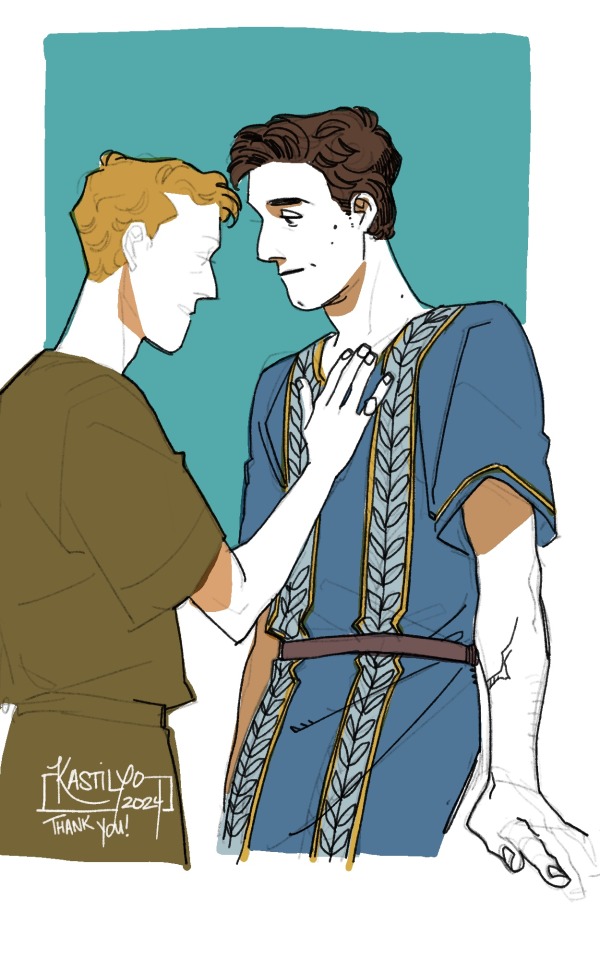
many thanks @twobeesornottwobees for helping me out with the theodosius biography!! at long last, agrippa makes a reappearance on my blog! and additionally octavian because it feels wrong to draw agrippa without him
#drawing tag#Roman Empire tag#i think#the timeline is nebulous tbh#Octavian#marcus vipsanius agrippa#thank you again!! that theodosius biography did critical damage to me in the best way
231 notes
·
View notes
Text
what the FUCK am I doing on the obelisk of theodosius.



#barn owl therian#me fr#alterhuman#nonhuman#therian#therian community#therian gear#therianthropy#therian mask#owl therian#owlkin#bird therian#birdkin
23 notes
·
View notes
Text
anyway, this is funny to me




#they're the same!#my. twinification agenda? it's not even twinification since i modeled valentinian off of theodosius#that's an entirely different can of worms
3 notes
·
View notes
Text

they feel the weight of armand's stare on their temple, on the ruby red vitality that dribbles steadily down beside their ear. even without looking directly at his gaze, theo can see the vast black of his pupils, how serrated the turn of his smile is. the air smells like sweat and dirt, turning coppery deep in their sinuses, and theo wonders — does he enjoy this?
and if so, is it the violence amongst beasts that thrills him, or the blood oozing from theo's split brow?
“ he's getting there. he doesn't know how to balance when i switch sides. ” their gaze cuts to their opponent, where he leans heavily on the sides of the ring and drags his paws through the dust, testing the strength of his muscles. armand admonishes him; theo scoffs. “ one of us has to be confident in me. ”

the moderator gestures, and theo stands, shakes off the exhaustion from their shoulders. the ring clears, and theo tries not to track where armand flutters away to. the lycan across from them leaps, messy and uncoordinated, and theo sidesteps, a dance they've practiced many times. when he stumbles up against the wall, theodosius rises in theo, through theo, breaking bones and shedding skin, all shining gold teeth and strength. the shift takes long enough for his opponent to rouse, to slash at his belly with quick claws; he takes the attempt in stride, pain sluicing hot and biting just above his navel, and tears the gray wolf's throat clean open.
bring me his cuspids, armand had said, and the command sizzles through their veins; theodosius shows teeth, a wolf on the hunt, and pries that jaw open easily with his claws. he oozes blood, still breathing, but he won't be conscious again anytime soon; if at all. the jeers only grow louder, the crowd calling out for blood, for violence, and he fits his fingers around those iron-slicked teeth, four quick tugs depositing gleaming fangs into his paw.
wolf stands, tall and proud, hackles lifted into ragged spikes, and paces towards the edge of the arena. careful, minding the talons, he holds out a palm to the vampire: one, two, three, four cuspids, just for him. theodosius shows all his own teeth, still where they belong in his maw, bloodier now but no less triumphant.

in the heat of a fight armand often loses all sense of his surroundings. even the violent ring - side jeering reduces down to an ignorable buzz. there was beauty to it. even in the midst of cracking knuckles and blood that flowed from the hot source, straight from the heart, armand is not bothered in the least.
it was not home by any means, but when he crawls up into that ring with theodosius and the world comes crashing back down between them, it was as close as any home armand had ever lived experienced.
blood drips from theo's eyelashes.
the sanguinity of those tears brings armand back down to earth. red, garishly red, blood seeps from theo and he quickly pulls a bandage package from the small bag strapped to his thigh. within moments of bringing it to the man's eyebrow it seeps through with his blood.
“ i think he's quite tired. ”
when he turns his head to get a good look at the man he's surprised to see just how much blood splays out across the cement. it looks wet and slick.
“ keep knocking him down. look at his legs. ” armand faces theo again. his pupils are large, bulbous in his face. hungry with the victory already as near as it is. “ he's still shaking. it's endurance at this point, that's all. don't get cocky. ” a smile.
“ you haven't come this far just to come this far. ”

“ bring me his cuspids. ”
#godpyre#THREAD.#bro thats the most romantic thing ive ever heard#armand gets theo and theodosius hes SO lucky *heart eyes*#sorry i answered this instantly when i said i was going to sleep. it will happen again#VERSE. MY HEAD IS BLOODY‚ BUT UNBOWED.#i have approximately 0 werewolf icons smh
7 notes
·
View notes
Text
Stranger part 12

Reader is Telemachus' friend, and when he leaves for his "diplomatic mission" he asks her to watch over his mother.
Later, once the king has returned, she stumbles upon an injured Poseidon.
Previous / series masterlist / character sheet / next

Content specs: she/her pronouns used, afab reader, Platonic! Telemachus x reader, Epic!Poseidon x reader, possible OOC!Poseidon, Polites’ daughter! Reader, unrequited love, blood, fighting, nudity, illusion, possibly more?, trying to avoid using y/n, slowburn, suggestive themes, English is not my first language, sorry if it's too much exposition, it's my first fic.
Ónoma literally means name in Greek, at least according to google translate. View this as the y/n of this fic.

“Are you done yet?” Perikles asked, less than amused. Ónoma had been laughing at him for the past, what? 15 minutes? It was way shorter than that, but it felt like ages for the God.
“No, not yet.” It was her turn to tease him. Her laughter would’ve died long ago, but the fact that it bothered him so much kept her going. “Alright, fine, I’m done. Now let’s get you wrapped up, huh?”
She’d added honey to one of her mother’s old ointment recipes to stop his healing wounds from getting infected. She’d left the wounds unwrapped to dry up and form scabs, but it also left them vulnerable. She was going to need new bandages soon.
“You know, I never did find out what caused your wounds.” Peach murmured.
“You never asked, but do you really want to do so now? An answer for an answer, remember?”
“We made that deal an hour ago, of course I remember.” She replied, dumbfounded. What kind of questions did this guy have for her? How bad could they truly be? “Tell me, Perikles, what caused those wounds?” She asked, somewhat smug about finally getting answers.
“My very own trident, wielded by a man who wounded someone I love. I searched for him for 10 years, and when I finally found him, I lost.” All initial smugness was lost on Ónoma, she’d not expected such a raw, honest answer from the man.
“What? Didn’t expect me to answer? A deal is a deal, I’m a man of honour.”
“Making sexual advances on an underage girl? Very honourable.” She remarked sarcastically.
“You’re underage?” The man asked, eyebrow raised.
“Is that the question you want to ask?” She echoed his earlier sentiments. He gave a nod. “Only for another week.” She mumbled.
“What difference does one week make?”
“Was that a rhetorical question, or do you want to get philosophical?” She countered.

At the end of the day, she was able to retreat to her own space, sure, the cement and stuff hadn’t fully dried yet, but as long as she didn’t touch the walls, it’d be fine. Telemachus had even gone as far as to have a bed placed in the room already. Gods bless him.
The rest of the day had gone by with a lot less serious questions and some really nice dinner. The fish traps had been a success, she’d even brought the excess into town. Aside from their little spat earlier, it has been a good day, but it was not a good morning.
Before sunrise some of the towns people had come to get her, Ophelia was giving birth, but it was about a month too early. By the time she got there it was a bloodbath. Irene, Agathe and their mother were crying over the state of Ophelia. Ophelia’s husband was screaming at the healers, and all in all it was an outright mess.
First course of action: get the unnecessary people out of the room. Irene was easy to deal with, she understood her sister needed help and that they were in the way. She helped Ónoma get her mother and sister out, while Ónoma had the luck to deal with her brother-in-law. Theodosius was erratic, the only way she was able to get him outside, was by knocking him out.
It took them countless prayers to Eileithyia, and Apollo, to get through the birth, and it took until sunset for them to stabilize the mother and her beautiful baby boy. Ónoma was the one to deliver the news, as she’d been there for the shortest amount of time. The other healers, mainly consisting of elderly women, had pretty much collapsed when they were done, absolutely exhausted.
Irene flung herself into her arms, Agathe was trying to explain the news to, a probably concussed, Theodosius and their mother, Zosime, ran inside to see her daughter and grandchild.

When Peach got back home, she was once again covered in blood, but this time she was able to take a bath without being afraid of the stranger in her home. Sure, she still didn’t really know the man, but she at least knew him better now.
“Where have you been all day, why are you covered in blood? Again? you know what, I don’t even want to know. I don’t want to know, just barge right on in, in the middle of the night, who cares?” Perikles rambled, but she paid him no mind. “I’ll tell you tomorrow.” Peach called through the closed door.
She had put in clean water yesterday, but she couldn’t be bothered to heat it up right now, she just wanted to be clean. And clean she was, by the time she got out her hands were wrinkled, and her skin was rubbed raw. She looked exhausted when she caught a glimpse in the water’s reflection.
Despite the exhaustion, she was tossing and turning all night. She’d tried to eat a peach before going to bed, but she couldn’t, even though she hadn’t eaten all day. Her head was reeling, what was it with Irene’s sisters and giving her trouble. She didn’t blame Ophelia for the circumstances around the birth of her son, not really, but it was interesting.
When the sun started to rise she decided to just get up, without having slept a wink that night. Sleepless nights were becoming a more common occurrence. When Ónoma went into town to get breakfast, she brought some to the new parents, giving the father a somewhat shitty apology for knocking him out. She offered them her help, should when they need it with a newborn on their hands.
When she entered her house, Perikles was awake, but still in bed. “I was gone because the healers needed my assistance, there was a birth that was a month too early, hence the blood, and the first time I’d been defending the queen from… monsters? They were men, but they very well could have been monsters.” She said in one breath, then continued after taking a deep one. “I think that three? Yeah, three answers you owe me.”
“Well good morning to you too.” He smiled at the girl’s rambling. “Say, do you practice archery too? Oh great Apollo 2.0?”
“You want to make it four? Anticlea used to teach me, but she passed a long time ago. I haven’t been able to learn from anyone since. Besides, I’m not devoted to Apollo, if that’s what you’re implying. Please do not compare me to a God, that usually does not end well.”
“Shame, I’m sure he’d love to have you. The perfect devotee.” She blushed at the implication. “I thought you said you weren’t a healer?”
“Five, I’m not, but I do help out when they need it. My mother taught me, but I’m not fully trained.”
“Why didn’t she finish training you?”
“She’s dead. Six.”
Next.

Taglist:
@apollos-dodgeball-target
@barrythestrawberry041
@doodle-with-rhy
@isla-finke-blog
@suckerforblondies
@trashcannotbealive
#epic the musical#epic!poseidon#poseidon#poseidon x reader#telemachus#telemachus x reader#epic odysseus#epic the stranger saga
49 notes
·
View notes